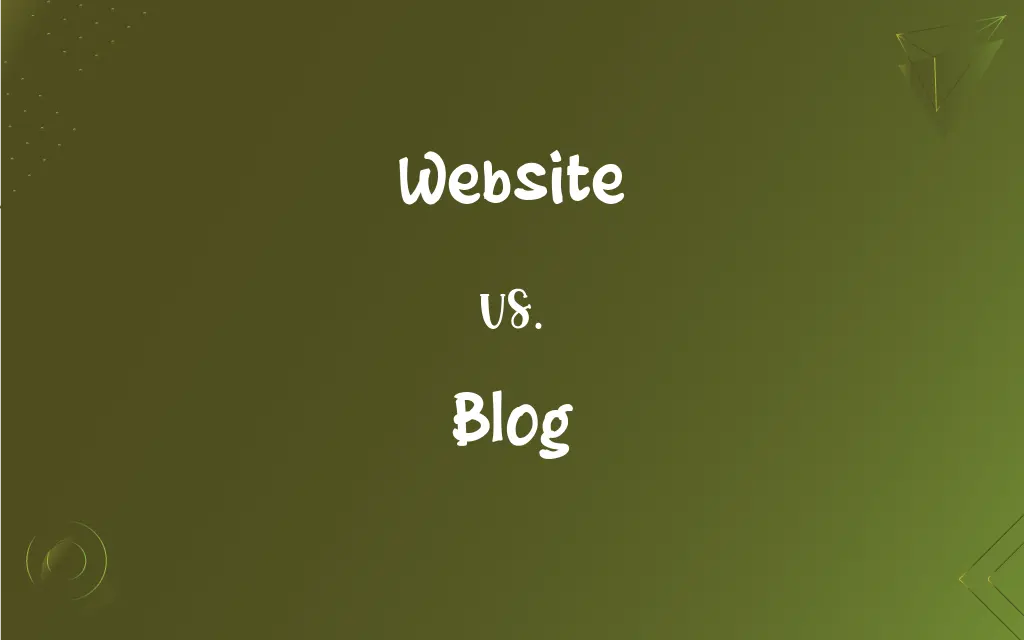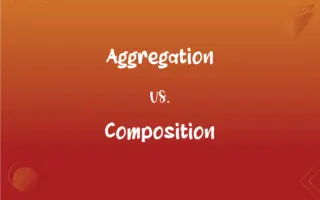Website vs. Blog: What's the Difference?
Edited by Aimie Carlson || By Janet White || Published on February 3, 2024
A website is a collection of interconnected web pages under a single domain, while a blog is a type of website with regularly updated posts, often in a conversational style.

Key Differences
A website is a broader concept encompassing any collection of web pages accessible under a single domain name. It can serve various functions, from providing information to hosting online services. In contrast, a blog is a specific type of website dedicated primarily to written content, usually in a diary-like format, where posts are regularly updated and displayed in reverse chronological order.
Websites can range from simple static pages to complex portals with dynamic content and interactive features. Blogs, on the other hand, are typically focused on content creation, often centered around a particular theme or subject matter, and allow for reader engagement through comments.
The content on a website can be diverse, including text, images, videos, and downloadable files, and it may not require frequent updates. Blogs are characterized by their regularly updated content, often informal or conversational in tone, which encourages reader interaction and community building.
In terms of design and structure, websites may have a more complex architecture, including multiple pages and sections for different types of information. Blogs usually have a simpler structure, often with a main content area for posts and a sidebar for categories, tags, and archives.
Websites are used for a wide range of purposes, from corporate presence to online retailing, educational platforms, and more. Blogs are generally used for personal expression, information sharing on a specific topic, educational purposes, or as a part of a larger website's content strategy.
ADVERTISEMENT
Comparison Chart
Purpose
Varied (information, commerce, services)
Focused on regular content posting
Content Update
Varies (often static or infrequently updated)
Regularly updated
Style
Formal or diverse styles
Often informal and conversational
Structure
Can be complex with multiple pages/sections
Typically simpler, diary-like format
Engagement
Varied interaction levels
High engagement, often with comments
ADVERTISEMENT
Website and Blog Definitions
Website
Websites can be used for a variety of purposes, including e-commerce, education, and entertainment.
I found a great recipe on a cooking website.
Blog
A blog is a regularly updated website or web page, typically run by an individual or small group.
She shares her travel experiences on her personal blog.
Website
A website is a collection of web pages under a single domain, accessible via the internet.
Our company's website provides detailed information about our products and services.
Blog
Blogs often feature diary-style text entries, photographs, and links to other websites.
His tech blog covers the latest industry news and trends.
Website
Websites are hosted on servers and require a web browser to access.
Visit our website for more information on the event.
Blog
Blogs allow readers to interact with the content through comments and discussions.
There was a lively debate in the comments of her latest blog post.
Website
A website can be static, offering the same content to all visitors, or dynamic, providing personalized content.
The news website updates its content throughout the day.
Blog
Many blogs provide educational content, tutorials, and personal perspectives on various subjects.
Her cooking blog has easy-to-follow recipes for beginners.
Website
A website's design and functionality can vary greatly depending on its purpose.
The artist's website showcases a portfolio of her work.
Blog
Blogs can focus on a wide range of topics, from personal life to specific subjects like food or politics.
I follow a fitness blog for workout tips and healthy recipes.
Website
A set of interconnected webpages, usually including a homepage, generally located on the same server, and prepared and maintained as a collection of information by a person, group, or organization.
Blog
A website that displays postings by one or more individuals in chronological order and usually has links to comments on specific postings.
Website
(Internet) A collection of interlinked web pages on the World Wide Web that are typically accessible from the same base URL and reside on the same server.
You can find complete information about the products on the company's website.
Blog
To write entries in, add material to, or maintain a blog.
Blog
(Internet) A website that allows users to reflect, share opinions, and discuss various topics in the form of an online journal, sometimes letting readers comment on their posts. Most blogs are written in a slightly informal tone (personal journals, news, businesses, etc.)
Blog
(Internet) An individual post to a blog.
This blog was originally posted on my personal site but is reproduced on the forums for greater visibility.
Blog
To contribute to a blog.
Blog
To blag, to steal something; to acquire something illegally.
Blog
A shared on-line journal where people can post diary entries about their personal experiences and hobbies
FAQs
What differentiates a blog from other types of websites?
Blogs are characterized by regular, often informal posts, and reader engagement through comments.
Can a blog be part of a website?
Yes, a blog can be a section within a larger website.
What is a blog?
A blog is a type of website with regularly updated posts, often in a conversational style.
Do blogs have to be about personal topics?
No, blogs can cover a wide range of topics, from personal to highly specialized subjects.
What is a website?
A website is a collection of web pages accessible under a single domain name.
Are all websites interactive?
Interaction varies; some websites are static, while others, including blogs, are highly interactive.
Can a website exist without a blog?
Yes, many websites do not include a blog.
Are websites always public?
Most are public, but some can be private, requiring login credentials.
How often should a blog be updated?
Frequency varies, but regular updates are key to maintaining a blog.
How do blogs affect website traffic?
Well-maintained blogs can drive significant traffic to a website.
What's needed to start a website?
Starting a website requires a domain name, web hosting, and website design.
Can anyone start a blog?
Yes, anyone can start a blog, often with minimal technical skills.
What role do social media play in blogs?
Social media can be used to promote blog posts and engage with readers.
How do businesses use websites?
Businesses use websites for online presence, marketing, e-commerce, and providing information.
Do all businesses have websites?
Most businesses have websites, but it's not mandatory.
Are websites and blogs expensive to create?
Costs vary; some can be created for minimal cost, while others require significant investment.
Can blogs be monetized?
Yes, blogs can generate income through advertising, sponsorships, and product sales.
What impact does a website have on a business?
A website can significantly impact a business's reach, credibility, and customer engagement.
What's the main purpose of a blog?
The main purpose of a blog is to share regularly updated content on various topics.
Is technical knowledge required to maintain a website?
Basic websites require minimal skills, but more complex sites may require technical knowledge.
About Author
Written by
Janet WhiteJanet White has been an esteemed writer and blogger for Difference Wiki. Holding a Master's degree in Science and Medical Journalism from the prestigious Boston University, she has consistently demonstrated her expertise and passion for her field. When she's not immersed in her work, Janet relishes her time exercising, delving into a good book, and cherishing moments with friends and family.
Edited by
Aimie CarlsonAimie Carlson, holding a master's degree in English literature, is a fervent English language enthusiast. She lends her writing talents to Difference Wiki, a prominent website that specializes in comparisons, offering readers insightful analyses that both captivate and inform.
































































